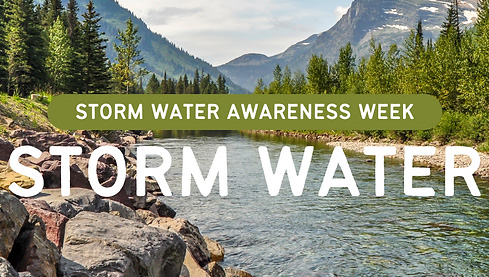Sweeping Industry News Bulletin |
September Stormwater Awareness Week Features Three Street Sweeping Seminars
Last year the single presentation on street sweeping, conducted by WorldSweeper's Editor, Ranger Kidwell-Ross, and noted sweeper researcher, Roger Sutherland, was among the top three most viewed at the entire event. This year's Stormwater Awareness event featured new information from that duo, as well as presentations by two other noted sweeping individuals.Stormwater Awareness Week 2024 was held from September 23–27 – and was free to attend and completely online!
The event was designed to "dive into what it means to protect the environment – one jobsite, industrial facility, city, and rain drop at a time." Storm Water Awareness Week is a collaboration effort of the storm water community that exists to provide an opportunity where you can earn professional development credits free of charge.
Here is info, along with links to the seminars, which are available on-demand:
Enhanced Street Sweeping Guidelines: How to Develop a Maximum Value Sweeping ProgramThe first of three back-to-back sweeping seminars was presented by WorldSweeper's Editor, Ranger Kidwell-Ross, and noted sweeper researcher, Roger Sutherland. Here's info on the what the seminar covered: Bring your sweeping program into the 21st century with the presenters’ usable takeaways of how a well-designed, funded, and managed street-sweeping program can become more than just the leading BMP solution for nutrient removal that recent studies have shown it can be. Seminar will include the importance of removing sediments, heavy metals, toxics, tire particles and other microplastics from stormwater and why enhanced street sweeping is emerging as the leading BMP in that regard. Also learn first-hand how to design your street sweeping program to become the ‘eyes' of your jurisdiction.
The link to view the seminar on-demand is located here.
A Data-Driven Approach to Enhance Street Sweeping for Water QualityThis seminar was conducted by Larry Walker Associates and the City of Los Angeles Watershed Protection Division. Note that these presenters are connected to sweeper testing, comparing the pickup ability of an Elgin mechanical broom sweeper with one of the company's regenerative air sweepers that was recently conducted by the City of LA and Larry Walker Associates. Here's info on the what the seminar covered as well as a link after that to watch it on-demand: Street sweeping can be a highly effective practice for protecting and improving water quality by removing the wide range of pollutants that accumulate on road surfaces. Street sweeping programs, however, often aren’t designed with water quality and pollutant removal in mind and the potential benefits of street sweeping for stormwater can go unrealized. The City of Los Angeles Watershed Protection Division and Larry Walker Associates shared a data-driven approach for integrating stormwater quality priorities into an enhanced street sweeping program by addressing critical questions like how, when, and where to sweep to maximize water quality benefit.
The link to view the seminar on-demand is located here.
Measuring Runoff Water Quality Improvement From Street Sweeping in Southern CaliforniaThis seminar was conducted by members of the Southern California Coastal Water Research Project. Here's info on the what the seminar covered as well as a link to view it on-demand: Street sweeping is often considered a non-structural stormwater best management practice (BMP) capable of reducing pollutant concentrations from streets during wet weather runoff. Many stormwater MS4 NPDES permits “credit” non-structural BMPs, including street sweeping, with 5-10% pollutant load reduction. Contrary to the important role of street sweeping in water quality planning, a literature review reveals that actual water quality of runoff post-sweeping has not been measured with statistical confidence, nor has a robust comparison to runoff quality from non-swept streets been verified. The organization's study developed and implemented a controlled, field-scale experiment whereby a custom-built rainfall generator was used to measure whether differences in runoff water quality can be measured between unswept and swept street segments. Testing of unswept and swept pavements occurred in a parking lot in Long Beach after 2 weeks of antecedent dry weather on three occasions. A regenerative air sweeper swept one side of the parking lot on the morning of each test day. Street sweeping resulted in measurable improvements in the concentrations and loads of total suspended solids, total phosphorus, total nitrogen, total PAHs, total coliforms, and total heavy metals including arsenic, cadmium, copper, nickel and zinc. Data to date showed that percentage reductions in runoff are greater than the assumed 10% for many parameters at the testing location. The link to sign up to view the seminar on-demand is located here. |
© 2005 - 2024
|
Industry Updates Contents
|